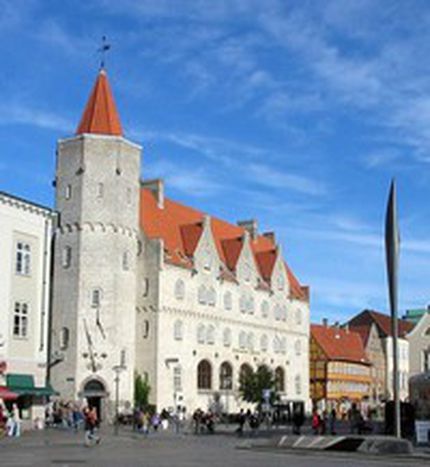
Denmark takes university education into the future
Published on
Translation by:
Francesca ReinhardtThe university in the Danish town of Aalborg was founded in 1974 with the goal of developing an alternative style of teaching. Instead of lectures and seminars, the focus is on practical ‘problem-based learning’.
Right now, Marcus from Germany, Christian from Denmark, as well as Kazimieras and Gediminas from Lithuania are working on their GPS Technology course project. They want to improve the precision of position determination by means of a GPS navigation system but have not yet agreed on a practical field of application to focus on. For the rest of the semester they will be working permanently on the problem they have chosen. This is the way that all students work at the University of Aalborg; for the first six weeks of term they learn the fundamentals through lectures and seminars, after which they work in project groups on problems relevant to their studies, often topics that they have sought out themselves. They work through the theory and then develop practical solutions based on their coursework. The students are supervised by a lecturer who helps them get their thoughts in order. The project work, based on ‘problem-based learning’, is at the core of the teaching.
Practical advantages
The students are supposed to be put in a position where they can take untested theoretical knowledge and apply it in practice. In this way, they are better prepared than other students for the world of work. Student Maria Fosnaes feels confident, “Working together, the team gets better results than individual members of the group could achieve.” Individual learning is increased as well, “You remember what you learned working on a project much better than what you learned in a lecture. I can still remember all the projects I worked on 20 years ago,” says Poul Thøis Madsen, Associate Professor for European economic integration at the University of Aalborg, who did his degree at the university.
The project groups also provide a social circle so that students don’t feel alone with their academic problems. This means that fewer students end up dropping out of their programmes. The project format lends itself above all to solving real life problems in the sciences. This has led to close cooperation between the university and numerous sectors of industry, which have set up shop in the surrounding area. Thus engineers from the University of Aalborg integrate themselves into the job market better than those from any other Danish university.
The Aalborg Model also has its problems: apart from the danger of over-specialising, all the deliberations over project content and different levels of expertise can make students feel overloaded. However, Poul Thøis Madsen sees this as an advantage too, “One way or another, it’s an earlier start on real life!”
Hardly used in Europe
Despite the positive feedback, universities that choose the Aalborg method of teaching are an exception in Europe. A problem-based learning approach, called “Mendeberri”, is a central pillar of the Mondragón Unibertsitatea in Spain’s Basque region. The goal is to provide students with optimal personal and professional development. The method of teaching at the University of Maastricht in the Netherlands is also centred on problem-based learning. As in Aalborg, the students there feel better prepared for the world of work than students in other universities. The 2002 Global Unesco Centre for Problem-Based Learning (UCPBL), hosted by the University of Aalborg, put forward agreements to spread the use of problem-based learning to universities worldwide. However, for the moment, most of the university’s links are with institutions outside of Europe, such as with the Olin College of Engineering, Needham, in the United States and with South Africa’sCentral University of Technology.
Translated from Das Aalborg-Modell: Studieren mit Zukunft in Dänemark



